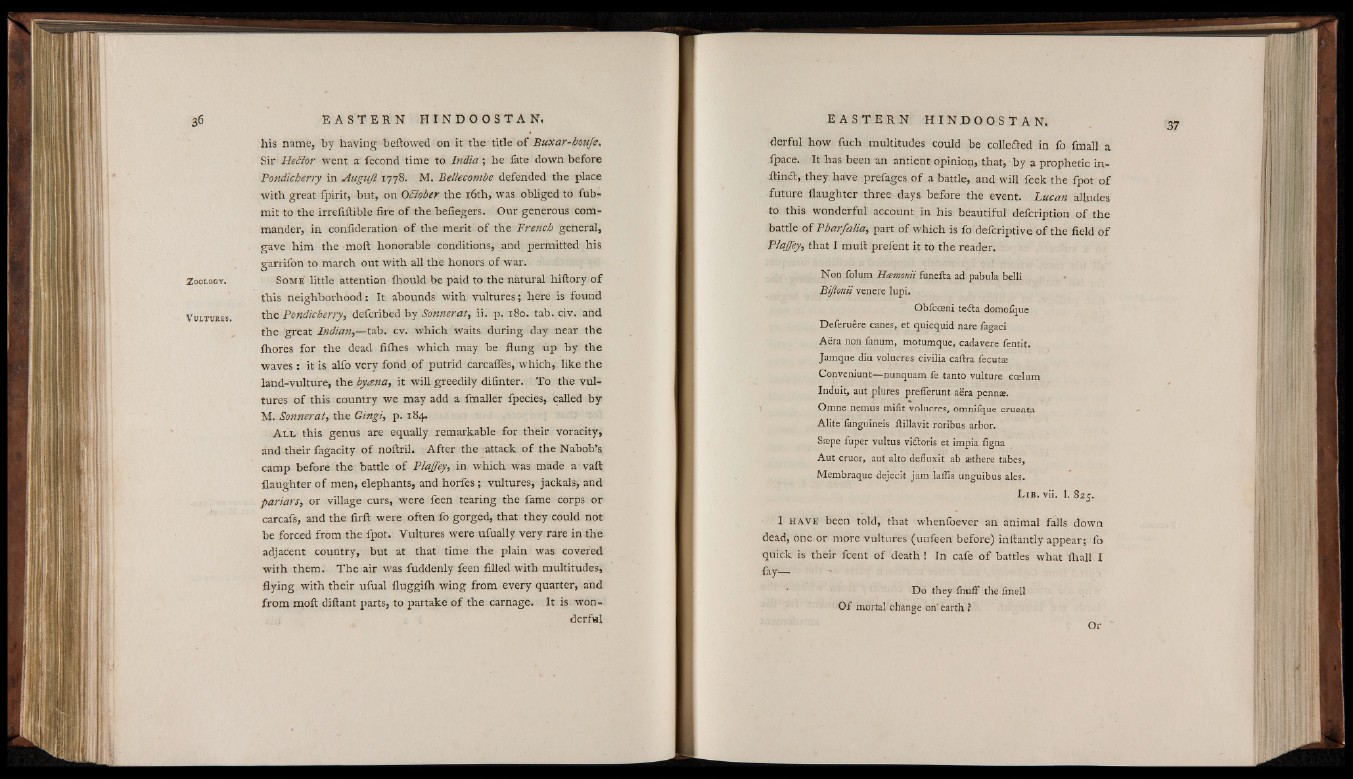
36
Z oology,
V ultures.
his name, by having beftowed on it the title o f Buxar-boufe,
Sir Hector went ar fecond time to India; he fate down before
Pondicherry in Augujl 1778. M. Bellecombe defended the place
with great fpirit, but, on OSiober the 16th, was obliged to fub-
mit to the irrefiftible fire o f the befiegers. Our generous commander,
in confideration o f the merit of the French general,
gave him the moft honorable conditions, and permitted his
garrifon to march out with all the honors o f war.
Some little attention ihould be paid to the natural hiftory of
this neighborhood: It abounds with vultures; here is found
the Pondicherry, defcribed by Sonnerat, ii. p. 180. tab. civ. and
the great Indian,—tab. cv. which waits during day near the
Ihores for the dead fiihes which may be flung up by the
waves : it is alfo very fond o f putrid carcafies, which, like the
land-vulture, the bytzna, it will greedily difinter. To the vultures
o f this country we may add a fmaller fpecies, called by
M. Sonnerat, the Gingi, p. 184.
A l l this genus are equally remarkable for their voracity,
and their fagacity o f noftril. After the attack o f the Nabob’s
camp before the battle o f PlaJJey, in which was made a vail:
flaughter of men, elephants, and horfes ; vultures, jackals', and
pariars, or village curs, were feen tearing the fame corps or
carcafs, and the firft were often fo gorged, that they could not
be forced from the fpot. Vultures were ufually very rare in the
adjacent country, but at that time the plain was covered
with them. The air was fuddenly feen filled with multitudes,
flying with their ufual fluggilh wing from every quarter, and
from moft diftant parts, to partake o f the carnage. It is wonderful
derful how fuch multitudes could be collected in fo fmall a
fpace. It has been an antient opinion, that, by a prophetic in-
ftinft, they have prefages o f a battle, and will feek the fpot of
future flaughter three days before the event. Lucan alludes
to this wonderful account in his beautiful defcription o f the
battle of Pharfalia, part of which is fo defcriptive o f the field of
PlaJJey, that I muit prefent it to the reader.
Non folum Htemonii funefta ad pabula belli
Bijionii venere lupi.
Obfcceni teila domoique
Deferuere canes, et quicquid nare fagaci
Aera non fanum, motumque, cadavere fentit.
Jamque dill volucres civilia caftra fecutte
Conveniunt— nunquara fe tanto vulture coelum
Induit, aut plures preflerunt aera pennae.
Omne nemus mifit volucres, omnifque cruenta
Alite fanguineis flillavit roribus arbor.
Saspe fuper vultus viitoris et impia figna
Aut cruor, aut alto defluxit ab iBthere tabes,
Membraque dejecit jam laffis unguibus ales.
Lib. vii. 1. 82 c.
I h a v e been told, that whenfoever an animal falls down
dead, one or more vultures (unfeen before) inftantly appear; fo
quick is their fcent of death ! In cafe o f battles what ihall I
lay— -s
Do they fnuff the fmell
O f mortal change on'earth f
Or '